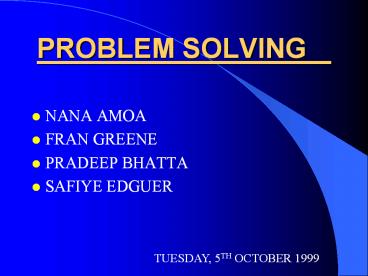PROBLEM SOLVING - PowerPoint PPT Presentation
Title:
PROBLEM SOLVING
Description:
If anyone is able to guess correctly the hat on his head, he walks free. ... that may introduce new concepts than ones covered in the lecture/recitation. ... – PowerPoint PPT presentation
Number of Views:143
Avg rating:3.0/5.0
Title: PROBLEM SOLVING
1
PROBLEM SOLVING
- NANA AMOA
- FRAN GREENE
- PRADEEP BHATTA
- SAFIYE EDGUER
TUESDAY, 5TH OCTOBER 1999
2
PRESENTATION CONTENT
- INTRODUCE PROBLEM SOLVING METHODS
- WORKSHOP
- BREAK UP INTO GROUPS
- DISCUSS THE THREE PRISONERS PROBLEM
- FORMAL SOLUTION OF PROBLEM TO ILLUSTRATE
PERTINENT PROBLEM SOLVING TECHNIQUES - DISCUSSION OF OPEN ENDED PROBLEMS
- CONCLUSION
3
TEACHING WITH PROBLEM SOLVING METHODS
- WHAT DO WE ACHIEVE WITH PROBLEM SOLVING EXERCISES
?
4
PROBLEM SOLVING IS A STUDENT CENTERED APPROACH !E
STUDENTS APPLY AND USE ACQUIRED KNOWLEDGE
ALLOWS STUDENT TO PARTICIPATE
OBTAIN FEED BACK ON STUDENT COMPREHENSION LEVEL
ALLOWS FOR STEPWISE LEARNING PROCESS
5
OPTIONS AVAILABLE TO INSTRUCTOR
- PRESENT CLEARLY ILLUSTRATED SOLUTION WITH
STUDENTS AS SPECTATORS - EXPLICIT GUIDELINES
- IMPLICIT GUIDELINES
- INTERACTIVE PROBLEM SOLVING
- ALLOW STUDENTS TO PRESENT AND ACT AS AN
INTELLIGENT SCRIBE.
6
PROBLEM STATEMENTThere are three men in a
low security jail.Two of them can see and the
third is blind.The warden of the prison having a
slow day decides to allow them to play a gameHe
decides that these are the conditions.He puts
them in a room and behind them lines up 5 hats.
He tells them that three of them are blue and the
other two are white They are not allowed to look
behind them
7
- At random he takes a hat and places it on their
heads. - They are not allowed to see the hats on their own
heads - They are allowed to see the hat on each others
heads if they can indeed see. - If anyone is able to guess correctly the hat on
his head, he walks free. If on the other hand he
guesses wrong, he is summarily executed. Deciding
not to gamble means that the status quo remains. - The first sighted man given the first go didn't
know what hat he was wearing - The second sighted man given the second go
thought about it but was also at a loss - The blind guy waiting last for his turn knew
straight away what hat he had on and walked free - Assuming that the prisoners are rational human
beings and of reasonable intelligence - What color hat did the blind guy have on and how
did he know it !!!
8
Instructors preparation
- Completely solve the problem beforehand.
- Time management.
- Prepare hand-outs.
- Keep out of class resources ready.
9
Selecting the Problem
- Base on prior knowledge of students.
- Note common pitfalls.
- Incorporate problems from real life.
- Include problems that may introduce new concepts
than ones covered in the lecture/recitation.
10
Solving the Problem First steps
- Clearly state the problem.
- Mention real world relevance, if appropriate.
- Allow enough time to read /comprehend /solve the
problem. - Trigger the thinking process.
11
And.
- Explicitly list all data.
- Diagrams Illustrations. May be some photos from
real life. - Break a big problem into parts.
12
Student interaction
- Develop group work strategies, if appropriate.
- Encourage question asking.
- Act as a scribe.
- Ask students to solve problems on the board.
13
Additional comments
- Make students aware of multiple approaches, if
they exist. - Review all steps.
- Identify and discuss common pitfalls.
- Design homework assignments appropriately.
14
OPEN ENDED PROBLEMS
- Multiple solutions
- More difficult problems which require longer
duration of time - Requires a greater level of thinking
- Requires teamwork
- Examples projects, case studies, research, etc.
15
PRESENTING OPEN ENDED PROBLEMS
- Create teams
- Present an overview and prerequisites
- Be general
- Allow students to brainstorm
- Ensure complete accessibility to resources
16
AND
- Require progress reports
- Do not solve problem for the students
- Require final report with all relevant materials
17
SUMMARY
- Be prepared
- Encourage Class Participation
- Allow the students to comprehend the problem and
the solution(s) - Choose problems that are relevant and challenging
- Remember there is no wrong answer
18
LAST WORD
- Problem solving is a symbiotic relationship































